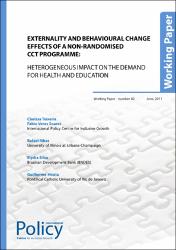Please use this identifier to cite or link to this item:
https://repositorio.ipea.gov.br/handle/11058/15311Full metadata record
| DC Field | Value | Language |
|---|---|---|
| dc.contributor.author | Teixeira, Clarissa Gondim | |
| dc.contributor.author | Soares, Fabio Veras | |
| dc.contributor.author | Ribas, Rafael Perez | |
| dc.contributor.author | Silva, Elydia | |
| dc.contributor.author | Hirata, Guilherme Issamu | |
| dc.date.accessioned | 2024-10-03T23:54:24Z | - |
| dc.date.available | 2024-10-03T23:54:24Z | - |
| dc.date.issued | 2011 | |
| dc.identifier.uri | https://repositorio.ipea.gov.br/handle/11058/15311 | - |
| dc.description.abstract | This paper investigates the impact of the pilot phase of Paraguay’s conditional cash transfer programme, Tekoporã, on the demand for healthcare and education, and how much of this impact was due to the cash transfers and/or due to changes in behaviour/preferences, possibly as an effect of other, non-monetary programme components such as the conditionalities and family support visits. It also explores the presence of externalities effects through a decomposition of the average treatment effect on the treated (ATT) into participation and externality effect. This decomposition was possible thanks to the use of two distinct comparison groups, one within the village and possibly exposed to the externality, and another in a different district not affected by the programme. The results indicate that the programme was successful in improving children’s attendance at school and increasing visits to the health centres. They also suggest that the positive impacts do not reach non-beneficiary families (no externality effect). In the pilot phase, with no conditionality enforcement in place, the role of conditionality and social worker visits is not yet clear. No differential effect was found for those who were aware of the conditionalities and/or were visited by social workers, although the message of the importance of education and healthcare somehow did reach the households, altering their preferences towards a greater consumption of healthcare and education services. (…) | en |
| dc.language.iso | en | |
| dc.title | Externality and Behavioural Change Effects of a Non-Randomised CCT Programme: Heterogeneous Impact on the Demand for Health and Education | en |
| dc.type | Working Paper | |
| dc.rights.holder | International Policy Centre for Inclusive Growth | |
| dc.rights.holder | United Nations Development Programme | |
| dc.location.country | Brasil | |
| dc.description.physical | 35 p. : il. | |
| dc.rights.type | Licença total exclusiva | |
| dc.rights.license | O texto e dados desta publicação podem ser reproduzidos desde que as fontes sejam citadas. Reproduções com fins comerciais são proibidas. | |
| dc.subject.keyword | CCT | |
| dc.subject.keyword | Health | |
| dc.subject.keyword | Education | |
| ipea.access.type | Acesso Aberto | |
| ipea.researchfields | N/A | |
| ipea.classification | Cooperação Internacional. Relações Internacionais | |
| ipea.classification | Desenvolvimento Social | |
| ipea.classification | Saúde | |
| ipea.classification | Educação | |
| Appears in Collections: | Publicações do IPC-IG | |
Files in This Item:
| File | Description | Size | Format | |
|---|---|---|---|---|
| en_IPCWorkingPaper82.pdf | 655.61 kB | Adobe PDF |  View/Open |
Items in DSpace are protected by copyright, with all rights reserved, unless otherwise indicated.

